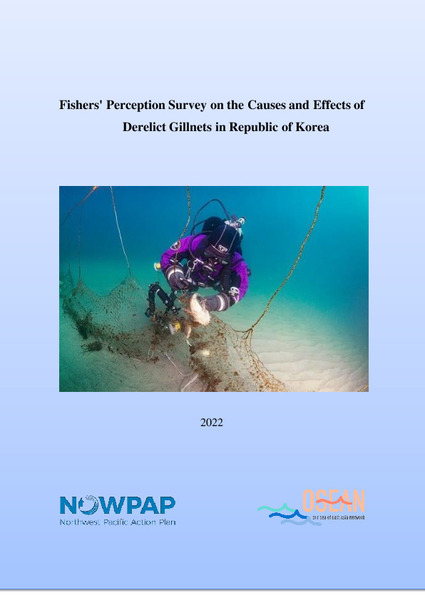Fishers' Perception Survey on the Causes and Effects of Derelict Gillnets in the Republic of Korea

Date
2022-10Author
United Nations Environment Programme
Northwest Pacific Action Plan
Citation Tool
Bibliographic Managers
RT Generic T1 Fishers' Perception Survey on the Causes and Effects of Derelict Gillnets in the Republic of Korea A1 United Nations Environment Programme, Northwest Pacific Action Plan YR 2022-10 LK https://wedocs.unep.org/20.500.11822/43070 PB AB TY - GEN T1 - Fishers' Perception Survey on the Causes and Effects of Derelict Gillnets in the Republic of Korea AU - United Nations Environment Programme, Northwest Pacific Action Plan Y1 - 2022-10 UR - https://wedocs.unep.org/20.500.11822/43070 PB - AB - @misc{20.500.11822_43070 author = {United Nations Environment Programme, Northwest Pacific Action Plan}, title = {Fishers' Perception Survey on the Causes and Effects of Derelict Gillnets in the Republic of Korea}, year = {2022-10}, abstract = {}, url = {https://wedocs.unep.org/20.500.11822/43070} } @misc{20.500.11822_43070 author = {United Nations Environment Programme, Northwest Pacific Action Plan}, title = {Fishers' Perception Survey on the Causes and Effects of Derelict Gillnets in the Republic of Korea}, year = {2022-10}, abstract = {}, url = {https://wedocs.unep.org/20.500.11822/43070} } TY - GEN T1 - Fishers' Perception Survey on the Causes and Effects of Derelict Gillnets in the Republic of Korea AU - United Nations Environment ProgrammeUnited Nations Environment Programme, Northwest Pacific Action Plan UR - https://wedocs.unep.org/20.500.11822/43070 PB - AB -View/Open
Item Statistics
Display item statisticsMetadata
Show full item recordDescription
Marine plastic pollution is being discussed as one of the three major global crises of climate change, nature loss, and pollution. Although the amount of marine plastic litter entering the sea is relatively smaller than total plastic wastes generated in the globe, it causes various and serious damages in the sea. Many literatures mention that the majority of marine plastic litter comes from land. However, the damage caused by derelict fishing gear from seaborn sources is not negligible but widespread, persistent, and irreversible. Among the derelict fishing gears, gill nets are reported on the seriousness of several literatures. In the case of Republic of Korea, the fishing nets used by gillnet fishing account for an important portion of the total fishing net use, and the report on the damage to the seabed ecosystem showed that the ghost fishing and the ecosystem damage caused by gillnets were the most serious.
In this study, we directly heard opinions on the causes and countermeasures of gillnet waste from gillnet fishermen in Republic of Korea and collected information on gillnet fishing gear. A total of 61 gillnet fishermen catches 22 different species, including akiami paste shrimp, swimming crab and angler fish. Fishers responded that the causes of derelict gillnets mainly generated due to being lost, followed by abandonment, discarding and others. Gear loss rate was estimated to be 16.9% and it was ca. three times higher than that of global average of gillnets in the recent research. ‘Extreme weather’ did not receive a high score of cause because of the fact that fishers may refrain from deploying their nets in bad weather conditions according to forecasts. In relation to gillnet types, drift nets were found to be longer and heavier on average than the set gillnets and encircling nets.
In general, fishers preferred government interventions such as collection projects and installing collection facilities over measures that required more active participation among fishers. They considered mandatory retrieval of fishing gear as well as implementing gear marking system as acceptable. On the other hand, reporting gear loss or zoning schemes to avoid gear conflict were not favorable. The low level in perceived efficacy in the case of reporting gear loss may indicate general rejection to the measure. ‘Gear marking’ and ‘extending outreach program for fishers’ were considered mostly ineffective by fishers despite its importance being emphasized among many other stakeholder groups and scientific research. The results imply that it is necessary to develop policies in which fishermen can actively participate for the effective implementation of the government interventions. Involving fishermen in policy development through workshop and providing compensation to fishermen who actively participate in measures can be helpful.
The most negative impact of DFG was ‘reduction of fishery resources’, followed by ‘destruction of marine habitats’, ‘damage to ships’, ‘generation of microplastics’, and ‘damage to marine life’. The most reported type of damage from DFG among 53 fishing vessels was propeller entanglement with 77%. The cost incurred by damages to vessels was the highest by ‘engine failure’ on average among all major target species, ranging from US $841 to US $8411 per one repair. The results indicate that the impact of DFG on gillnet fishery is ubiquitous and improved management by fishermen and government should be urgently implemented.
It is only a basic study conducted on only 61 of the 13,000 gillnet vessels. In the future, we will need to meet more fishermen and get more opinions before we can come up with a viable alternative to this problem.
Collections
Document Viewer
To read more, scroll down below.

